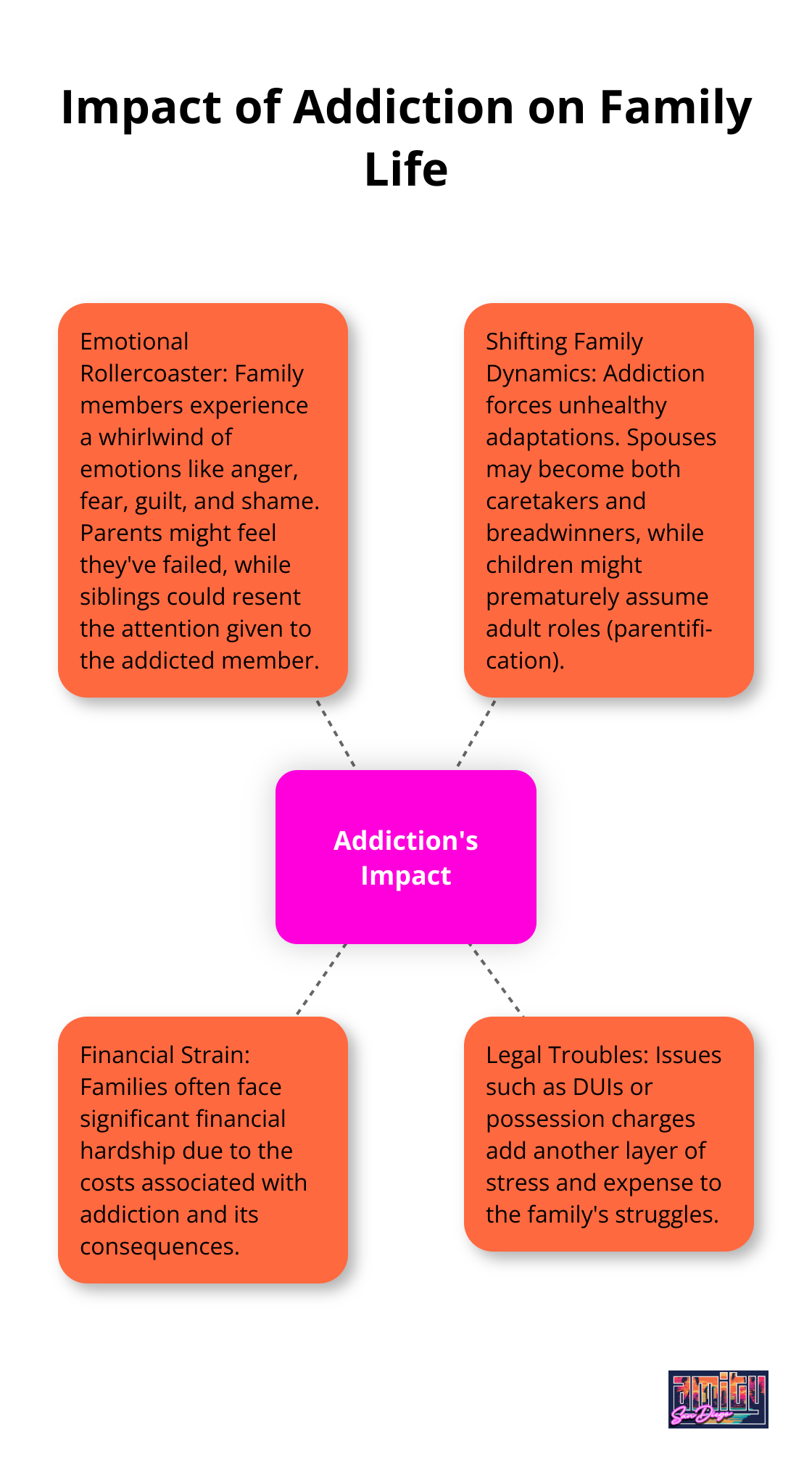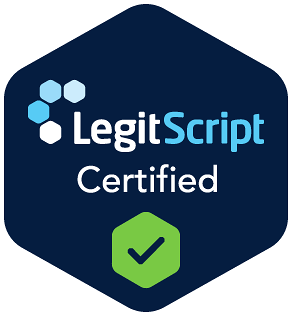Addiction doesn’t just affect individuals; it impacts entire families. At Amity San Diego, we’ve seen firsthand how family recovery plays a crucial role in overcoming addiction.
This blog post explores essential strategies for families navigating the challenging journey of recovery together. We’ll provide practical tips, communication techniques, and support methods to help families heal and grow stronger through the process.
How Addiction Reshapes Family Life
The Emotional Rollercoaster
Addiction affects more than the individual using substances; it transforms entire family systems. Family members often experience a whirlwind of emotions when living with addiction. Anger, fear, guilt, and shame become daily companions. Parents might feel they’ve failed their child, while siblings could resent the attention the addicted family member receives. Substance use disorders negatively affect emotional and behavioral patterns from the inception of the family, resulting in poor outcomes for the children and adults involved.
Shifting Family Dynamics
Addiction forces families to adapt in unhealthy ways. Addiction-affected families go through various and complex issues. A spouse might become both a caretaker and breadwinner. Children may prematurely assume adult roles (a phenomenon known as parentification). These role reversals can have long-lasting effects on personal development and family relationships.

Financial Strain and Legal Troubles
The cost of addiction extends beyond emotional turmoil. Families often face significant financial hardship. Legal issues (such as DUIs or possession charges) add another layer of stress and expense.
Addressing Addiction as a Family Issue
Family therapy sessions help families understand their collective role in the recovery process. Working together, families can create a supportive environment that promotes lasting sobriety and healing for all members. This collaborative approach recognizes that addiction impacts every aspect of family life and requires a unified effort to overcome.
The Path Forward
As families navigate the challenges of addiction, they must remember that recovery is possible. The next chapter will explore effective communication strategies that families can use to support their loved ones and foster healing within the family unit.
How Families Can Communicate Effectively During Recovery
Effective communication transforms family dynamics and supports long-term sobriety. Here are practical strategies families can implement:
Master Active Listening
Active listening involves giving full attention, showing understanding, and responding thoughtfully. When a family member speaks:
- Put away distractions (phones, tablets)
- Make eye contact and use open body language
- Paraphrase what you’ve heard to ensure understanding
- Ask clarifying questions instead of making assumptions
This technique builds trust and shows your loved one their feelings matter. Proper communication allows patients to be more knowledgeable about their prognosis and to be more proactive in seeking assistance.
[H2]Express Feelings Without Blame
Addiction often breeds resentment and hurt. However, accusatory language can shut down productive conversations. Use “I” statements to express your feelings without placing blame, which reduces defensiveness and promotes empathy.
“I feel worried when you come home late without calling” is more effective than “You always make me worry by being irresponsible.”
This approach allows you to share your emotions without putting the other person on the defensive.
Establish and Maintain Healthy Boundaries
Clear boundaries protect both the person in recovery and their family members. These aren’t punishments, but guidelines that promote respect and safety. Examples include:
- No substance use in the home
- Agreeing on curfews and check-ins
- Outlining consequences for broken agreements
- Respecting privacy and personal space
Consistency in enforcing boundaries is key. Boundaries protect both the individual in recovery and family members from harmful behaviors and stress. They define acceptable behaviors and support long-term recovery.
Implement Regular Family Meetings
Structured family discussions provide a dedicated time to address concerns, celebrate progress, and plan for the future. Tips for effective family meetings:
- Choose a neutral time when everyone is calm
- Set an agenda and time limit
- Give everyone a chance to speak without interruption
- Focus on solutions rather than dwelling on problems
- End with a positive activity or affirmation
These meetings create a safe space for open dialogue.
Implementing these communication strategies can create a supportive environment that fosters healing and growth. Recovery requires patience and practice. If you struggle to implement these techniques, seek professional guidance. Family therapy can provide additional tools and support tailored to your unique situation.
The next chapter will explore practical steps families can take to support their loved one’s recovery journey, building on the communication foundation we’ve established.
How Families Can Actively Support Recovery
Educate Yourself About Addiction
Understanding addiction as a chronic brain disease is essential. Drugs can alter important brain areas that are necessary for life-sustaining functions and can drive the compulsive drug use that marks addiction. The National Institute on Drug Abuse offers free, science-based resources that explain addiction’s biological and behavioral aspects. This knowledge helps families respond with empathy rather than judgment.
Attend family support groups like Al-Anon or Nar-Anon. These groups provide invaluable peer support and practical coping strategies. Many families find these groups eye-opening (realizing they’re not alone in their struggles).
Identify and Change Enabling Behaviors
Enabling often stems from love but ultimately harms recovery. Common enabling behaviors include:
- Making excuses for your loved one’s substance use
- Paying their bills or legal fees
- Covering up the consequences of their actions
Allow natural consequences to occur instead. Allowing a child to experience consequences is a valuable tool in guiding them toward behavior change. This approach isn’t about punishment, but about creating accountability. It’s challenging, but essential for long-term recovery.
Support Treatment Adherence
Recovery is a long-term process. Your loved one might feel discouraged or want to quit treatment prematurely. Here’s how you can help:
- Offer transportation to appointments and support groups
- Help them stay organized with medication schedules
- Celebrate milestones (no matter how small)
Create a home environment that supports recovery. Remove alcohol and unused medications. Establish consistent routines around meals and sleep.
Focus on Self-Care
Caring for someone in recovery is emotionally taxing. You can’t pour from an empty cup. Prioritize your own mental and physical health:
- Maintain your own therapy or counseling
- Exercise regularly
- Practice stress-reduction techniques like meditation
- Pursue hobbies and interests outside of caregiving
Taking care of yourself isn’t selfish – it’s necessary to provide sustained support.
[H3]Rebuild Trust Gradually
Trust takes time to rebuild after addiction. Set realistic expectations and celebrate small victories. Open, honest communication is key. Family therapy sessions provide a safe space to work through resentments and establish new patterns of interaction. Family therapy can help rebuild broken trust, polish up communication, treat generational trauma, teach healthy boundaries, and promote long-term recovery.
Final Thoughts
Family recovery from addiction challenges families but offers rewards. We explored key strategies to help families heal together, including communication techniques, support methods, and self-care. Recovery requires patience, persistence, and compassion for both your loved one and yourself.
Amity San Diego understands the complexities of addiction and its impact on families. Our outpatient programs offer personalized care, combining evidence-based treatments with holistic approaches. We provide a safe environment where families learn, grow, and heal together.
If you struggle to implement these strategies or feel overwhelmed, seek professional help. Family therapy provides invaluable guidance and support tailored to your unique situation. Our team of experienced clinicians at Amity San Diego supports you every step of the way.



